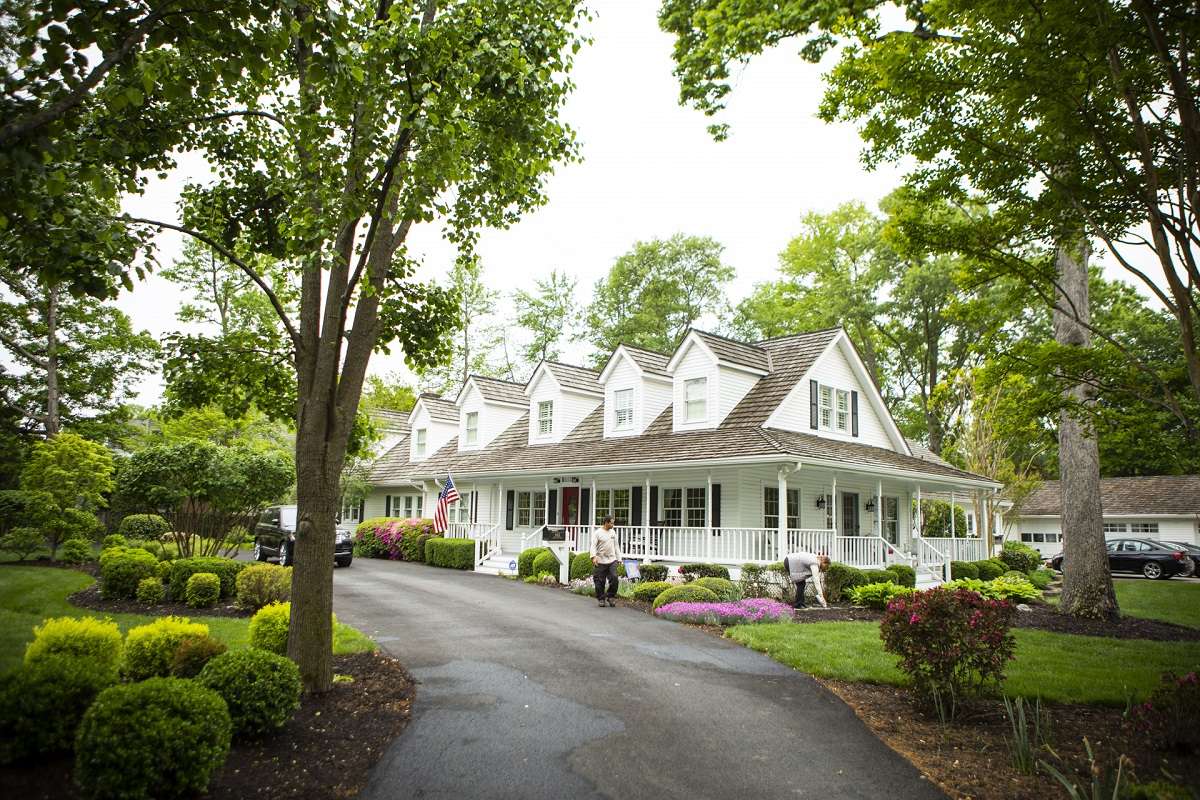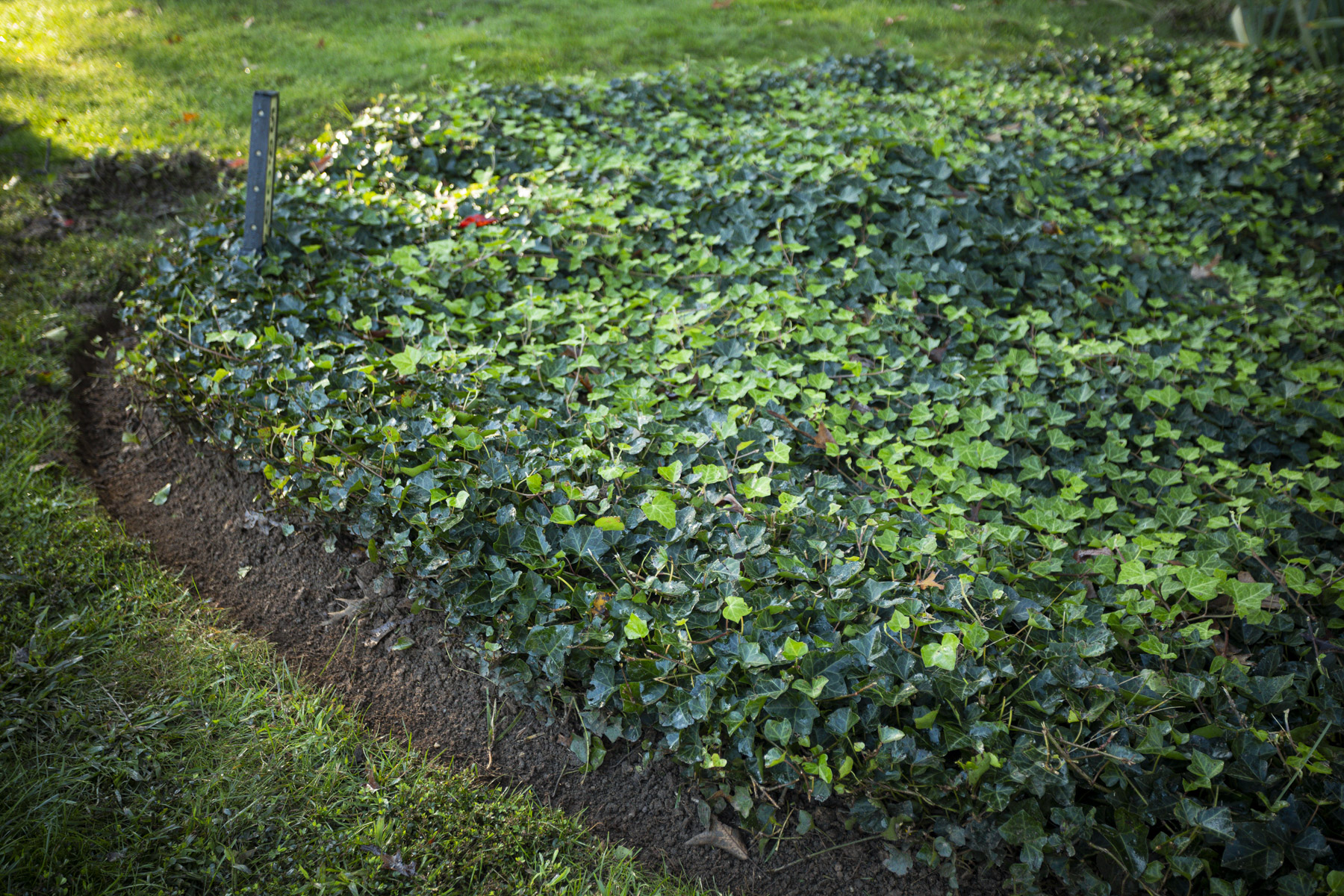


Choosing the best plants for your Northern VA property is an important decision. You’ll want to be sure to avoid invasive species which could cause trouble. Invasive landscape plants can quickly take over a small space or spread throughout your property, even choking out other plant material.
Of course, over the years, we have seen plenty of properties that have had invasive plants causing trouble.
That’s why we spoke to Kingstowne Landscape Designer Amanda McNiff about some of the invasive landscape plants to avoid on your property.
These invasive plants include:
1. English Ivy
2. Bamboo
3. Japanese Honeysuckle
4. Rose of Sharon
5. Chameleon Plant
6. Purple Loosestrife
7. Ground Elder
8. Tree of Heaven
We’ll also talk about some of our favorite alternatives to invasive plants, including some native and naturalized choices. At the end of the day, we want to help set you up for success with the right plant choices.
According to the official definition, an invasive plant is a non-native species that becomes a “weed pest” because of how quickly it grows and displaces other species. There are approximately 100 invasive plant species of Virginia that have been identified as problematic.

That being said, Amanda says it’s important to remember that even some plants that might not be officially ruled as “invasive” can become problematic for your particular space if they grow too big for the area. Those in smaller properties need to be especially mindful about choosing plants that won’t grow too big for their space.
Amanda shares the following 8 invasive plants that she recommends avoiding and why.
A lot of people like English Ivy because it’s a fast-growing vine, but Amanda says that she urges homeowners to avoid it unless it’s part of a container garden where it will be isolated.
“People often love to use it on hillsides since it does fill in quickly and grows well on a slope, but it will soon overrun everything else,” she says. “It will climb up trees, houses, and into your neighbor’s yard. It also happens to be a mosquito haven.”
Bamboo is a fast-growing and invasive grass that spreads rapidly underground. According to Amanda, homeowners sometimes choose this plant as a privacy screen. But there are other options, like dense evergreen selections, that can achieve the same results without completely taking over (like Bamboo will).
Due to many problems over the years with bamboo crossing property lines, Fairfax County recently issued an ordinance stating that property owners must contain Bamboo to their own property or risk penalties.
Japanese Honeysuckle is an invasive, non-native climbing vine. According to Amanda, it can grow pretty much anywhere….and will grow fast.
%20CC.jpg?width=4320&height=3240&name=Japanese%20Honeysuckle%20(Lonicera%20japonica)%20CC.jpg)
“I’ve seen Japanese Honeysuckle get so big that people think it’s a tree, but really it’s an invasive weed,” she says. “It will just keep growing and crowding out other landscaping.”
According to Amanda, homeowners often like the look of Rose of Sharon as it resembles a Hibiscus. But Rose of Sharon is on the invasive plant list in Virginia. It will outcompete other plants on your property for nutrients and water.
“Rose of Sharon is also a prolific seeder so it will spread quickly by wind, birds, and even just dropped seeds,” Amanda shares. “Hardy Hibiscus will give you a similar look without completely taking over.”
Chameleon Plant is another one of the invasive plants in Virginia. It spreads incredibly rapidly and is almost impossible to get rid of once you have it on your property. This plant does have bright-colored foliage which many find appealing, but it will quickly become a nuisance.
There are other low-growing groundcover choices that you can use that will not be invasive.
The Virginia Natural Heritage Program calls Purple Loosestrife a “highly invasive species” that will threaten native plant life. This perennial is native to Eurasia but has been growing in the United States as early as the 1800s when seeds made their way here on ships.
%20CC.jpg?width=3370&height=2203&name=Purple%20Loosestrife%20(Lythrum%20salicaria)%20CC.jpg)
While it’s a beautiful purple flowering plant, it can easily take over a landscape. A single plant can produce millions of seeds each year.
Also known as “bishop weed,” this is another fast-spreading perennial that can quickly take over a landscape. It is a groundcover that can tolerate even harsh conditions like poor soil. It can spread more than two feet per year.
Tree of Heaven is considered an invasive plant in Virginia because of its ability to crowd out native trees. First found in the United States in California during the Gold Rush, it is now found throughout the United States.
Unfortunately, the Tree of Heaven also happens to be the “tree of choice” for the invasive and destructive Spotted Lanternfly.
The above list is just a sampling of some of the invasive plants that we recommend avoiding in the landscape. There are many others. As we’ve mentioned, there might also be plants that aren’t officially considered “invasive” that still might not be the best choice for your landscape.
Fortunately, Amanda says many plants do make excellent choices here in Northern Virginia. This includes many native plant alternatives as well as naturalized plants.

Naturalized plants in Virginia are plants that might not originally be from here but perform well (and don’t cause trouble for natives). While we love Virginia native plants, sometimes a naturalized choice is best for a specific property.
As far as which alternatives to invasive plants are right for your property, there are lots of considerations that will go into figuring that out. This includes the purpose (or function) that you were trying to achieve with your plants as well as the growing conditions of your property (access to sunlight, soil conditions, etc.).
For instance, if you were thinking about bamboo because you were looking for an effective privacy screen, we might recommend an arborvitae or a holly instead. These plants can be great for screening but won’t be invasive.
“Just be wary of the variety of the plant you’re choosing,” says Amanda. “There are some perennials, for instance, that aren’t considered invasive but will keep spreading…perhaps more than you want them to. If you have a small landscape, this can be a problem. It always helps to understand what the plant will look like when it’s fully grown and what kind of maintenance will be involved. Some plants just require more maintenance to maintain their size and shape and prevent them from spreading.”
We understand that choosing and installing plants can get complicated. This is why it’s always best to consult with a landscape design professional with horticultural expertise. They can help you make the best decisions for your specific property.
After all, it’s not just about avoiding invasive plants but also considering micro-climate decisions related to your specific home. You’ll have to consider the soil, amount of shade, and other factors as you decide what will grow best. Just because a plant isn’t invasive does not mean it’s the best choice for your home.
The process can get complex and is best left in the hands of a pro.
At Kingstowne Lawn & Landscape, we know that proper plant selection and installation are incredibly important when it comes to your ultimate happiness with your landscape.
We know that when you purchase plant material you expect it to last many years. In addition to paying attention to proper planting zones, we’re also looking at both native and non-native options that might work best for you.
With an expert helping you make the best possible choices, you’ll feel confident that your landscape will be everything that you want it to be.
If you’d like to discuss landscape installation, plant health care, pruning or mulching for your landscape, let's get in touch! Request a quote, get your customized plan and relax knowing that your plants are in good hands.
Image Sources | Japanese Honeysuckle, Purple Loosestrife

Since its founding, Krisjan has led Kingstowne Lawn & Landscape with a straightforward philosophy: treat every customer like the “only” customer. His passionate pursuit of excellent customer service has led to 28 successful years and a thriving company with over 85 employees. Since 1997, Kingstowne has helped thousands of homeowners in the Alexandria, Arlington, and Springfield, VA area get what they want - a worry-free property they can be proud of.




If You're Looking For a Sign, This is It.
Seriously, that lawn isn't getting any better on it's own. Mrs. Jones just called the HOA on you